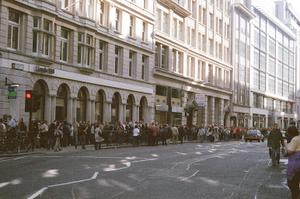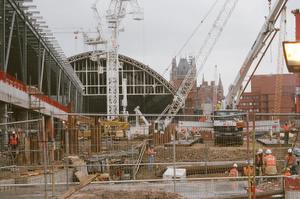This months meeting took place to the organ music from the wedding taking place in the Church of Scotland upstairs. Our first speaker was Tricia Hayne who gave us an interesting talk on the Cayman Islands, which were first discovered by Columbus' son and in 2003 celebrated their 300th anniversary. The island's main income is due to its offshore financial companies, but also tourism and it was obviously this area Tricia spoke about. She showed us the local wildlife including the blue Iguana and the Butterfly Farm. For the more energetic traveller there is diving on the Cayman Trench and some rock climbing. Not to mention the beautiful beaches.
After the break Pamela Goodall told us about her cycle adventure around the world with a tent! Her journey took her through Europe, she made it to Germany before her first puncture, where another cyclist helped her out. She had quite an adventure, being propositioned by a dodgy hotel manager in Rawalpindi and “kidnapped” by a shopkeeper for 4 days in India. After a crash on her bike she went on “Good Morning India” with two black eyes that the presenters didn't even bother to ask her about! Her trip continued through Asia where she visited Vietnam and China where strangers kept appearing to take care of her. She came home via Mexico and the USA. Pamela's talk finished to the accompaniment of Bach’s Toccata & Fugue (thanks to Globie Sarah D for identifying that) as the wedding upstairs ended.
Forthcoming London meetings:
Saturday 4th June – 2.30 pm – usual Crown Court location
John Gimlette will talk about his travels in Labrador and Newfoundland, called a “Theatre of Fish” and Tim Mackintosh-Smith will discuss his travels in India in a talk entitled “The Hall of a Thousand Columns”.
Saturday 2nd July – 3.00 pm NB – change of meeting place and time
Concert Artistes Association, 20 Bedford Street, Covent Garden, London WC2
This is the last meeting before the August break, when we'll be back in September. There will be an examination of Members Slides comprising eight mini-presentations from Globetrotters members.
London meetings are held at The Church of Scotland, Crown Court, behind the Fortune Theatre in Covent Garden at 2.30pm the first Saturday of each month. There is no London meeting in August, but we will be back in September. For more information, you can contact the Globetrotters Info line on +44 (0) 20 8674 6229, or visit the website: www.globetrotters.co.uk






 So, instead, we went to the Bank of England and we
joined a guided tour there. It was excellent! Believe it or not,
the site of the Bank of England, which has been located in
Threadneedle Street since 1734, covers a massive 3 ½ acres – who
would have thought it! We moved down a very majestic staircase
to some beautiful state rooms downstairs and through the
gardens and up again to the rooms that are used to hold meetings
with visiting officials to discuss monetary policy. The tour ended
in the Bank's museum which is fascinating and includes a gold
bullion bar, encased in bullet proof glass, of course, which
Padmassana had a go at lifting through the specially designed hole
for people to touch the bar. You can visit the museum any time and
it is free of charge. The museum is open Monday to Friday, 10.00 –
17.00, Christmas Eve, 10.00 – 13.00 but is closed at weekends and
on Public and Bank Holidays.
So, instead, we went to the Bank of England and we
joined a guided tour there. It was excellent! Believe it or not,
the site of the Bank of England, which has been located in
Threadneedle Street since 1734, covers a massive 3 ½ acres – who
would have thought it! We moved down a very majestic staircase
to some beautiful state rooms downstairs and through the
gardens and up again to the rooms that are used to hold meetings
with visiting officials to discuss monetary policy. The tour ended
in the Bank's museum which is fascinating and includes a gold
bullion bar, encased in bullet proof glass, of course, which
Padmassana had a go at lifting through the specially designed hole
for people to touch the bar. You can visit the museum any time and
it is free of charge. The museum is open Monday to Friday, 10.00 –
17.00, Christmas Eve, 10.00 – 13.00 but is closed at weekends and
on Public and Bank Holidays.
 After the Bank of England tour, we visited one of the
livery companies near Smithfield market and after a fry up at the
Beetle's favourite 24/7 greasy spoon café, we headed up to St
Pancras and joined a tour run by Arups, the consulting engineers
responsible for building the new ST Pancras train staton which is
to be the new home of the Eurostar as well as a new and upgraded
train station for regional trains.
After the Bank of England tour, we visited one of the
livery companies near Smithfield market and after a fry up at the
Beetle's favourite 24/7 greasy spoon café, we headed up to St
Pancras and joined a tour run by Arups, the consulting engineers
responsible for building the new ST Pancras train staton which is
to be the new home of the Eurostar as well as a new and upgraded
train station for regional trains.